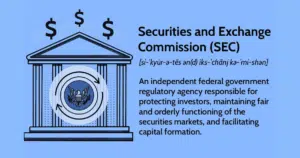The Role of the Securities and Exchange Commission (SEC)
The Securities and Exchange Commission (SEC) is an independent federal government regulatory agency in the United States.
Established by Congress in 1934 following the Wall Street Crash of 1929, the SEC safeguards individuals and organizations against market manipulation.

Securities and Exchange Commission (SEC) | Source: Investopedia
Its core mission is to protect investors, foster fair and efficient markets, and facilitate capital formation.
SEC’s Role in Safeguarding Investors
The SEC plays a crucial role in protecting investors and their assets since American households own over 58% of the US equity market through various investments like mutual funds and retirement accounts.
The SEC requires market participants to disclose comprehensive and timely information to fulfill its mission.
This disclosure helps investors make well-informed decisions.
The SEC’s Office of Investor Education and Advocacy provides valuable educational resources to investors, keeping them updated on relevant information.
Investor Protection and Capital Formation
The SEC protects investors by enforcing federal securities laws, holding wrongdoers accountable, and deterring future misconduct.
It also facilitates capital formation by assisting companies in raising funds, promoting job creation, and fostering innovation.
The SEC continually adapts its expertise and regulations to maintain orderly and efficient markets, keeping pace with market developments and trends.
Under the leadership of Gary Gensler, a former MIT blockchain professor, the SEC has had a complex relationship with the crypto industry.